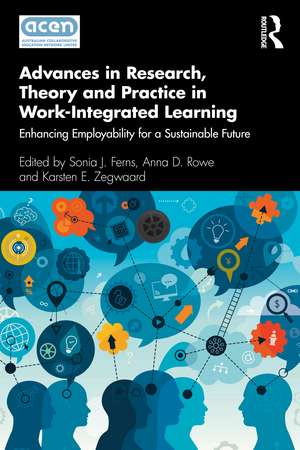Advances in Research, Theory and Practice in Work-Integrated Learning: Enhancing Employability for a Sustainable Future
Editat de Sonia J. Ferns, Anna D. Rowe, Karsten E. Zegwaarden Limba Engleză Paperback – 30 sep 2021
This book is essential reading for researchers, practitioners, workplace and community partners, university leaders, and policy makers, as the practice of WIL continues to expand in the higher education sector.
| Toate formatele și edițiile | Preț | Express |
|---|---|---|
| Paperback (1) | 371.06 lei 6-8 săpt. | |
| Taylor & Francis – 30 sep 2021 | 371.06 lei 6-8 săpt. | |
| Hardback (1) | 1000.27 lei 6-8 săpt. | |
| Taylor & Francis – 30 sep 2021 | 1000.27 lei 6-8 săpt. |
Preț: 371.06 lei
Nou
Puncte Express: 557
Preț estimativ în valută:
71.01€ • 73.36$ • 59.10£
71.01€ • 73.36$ • 59.10£
Carte tipărită la comandă
Livrare economică 25 martie-08 aprilie
Preluare comenzi: 021 569.72.76
Specificații
ISBN-13: 9780367897758
ISBN-10: 036789775X
Pagini: 298
Ilustrații: 20
Dimensiuni: 156 x 234 x 18 mm
Greutate: 0.96 kg
Ediția:1
Editura: Taylor & Francis
Colecția Routledge
Locul publicării:Oxford, United Kingdom
ISBN-10: 036789775X
Pagini: 298
Ilustrații: 20
Dimensiuni: 156 x 234 x 18 mm
Greutate: 0.96 kg
Ediția:1
Editura: Taylor & Francis
Colecția Routledge
Locul publicării:Oxford, United Kingdom
Public țintă
Postgraduate and ProfessionalCuprins
1.Contemporary insights into the practice of work-integrated learning in Australia Section 1 Teaching and learning within WIL programs 2. The framing of employability policy and the design of work-integrated learning curriculum 3. Designing a work-integrated learning curriculum 4. Authentic assessment design for work-integrated learning Section 2 Engagement with Stakeholders 5. Engaging stakeholders in work-integrated learning: A sustainable model for curriculum co-creation 6. Professional accreditation: A partnership proposition Section 3 Maximizing learning outcomes through WIL 7. Work, resilience and wellbeing: The long game of work-integrated learning 8. Effective supervision: A key consideration in work-integrated learning 9. Support for student learning in work-integrated learning: A holistic framework 10. A quality framework for developing and assuring high-quality work-integrated learning curricula 11. Evaluating work-integrated learning Section 4 Exploring the diverse forms of WIL practice 12. Innovation in work-integrated learning 13. Developing university learners’ enterprise capabilities through entrepreneurial work-integrated learning 14. Service-learning as an approach to work-integrated learning 15. Designing and implementing interdisciplinary project-based work-integrated learning 16. International students and work-integrated learning: Overcoming challenges and looking to the future 17. Closing the gap: Facilitating employability development in international internships Section 5 Support and infrastructure to develop good WIL practice 18. Leadership that supports an institutional approach to work-integrated learnings 19. Governance and Risk Management 20. Student access and equity in work-integrated learning: A work in progress 21. Using technology platforms for work-integrated learning Section 6 Future directions 22. The future of work-integrated learning: Vision and insights
Notă biografică
Sonia J. Ferns, Adjunct Associate Professor, Curtin University, Australia, and Partner, LearnWork Consulting.
Anna D. Rowe, Senior Lecturer, Portfolio of the Pro Vice-Chancellor, Education and Student Experience, and School of Education, University of New South Wales, Australia.
Karsten E. Zegwaard, Director of Work-Integrated Learning Research, Office of the Vice Chancellor, University of Waikato, New Zealand.
Anna D. Rowe, Senior Lecturer, Portfolio of the Pro Vice-Chancellor, Education and Student Experience, and School of Education, University of New South Wales, Australia.
Karsten E. Zegwaard, Director of Work-Integrated Learning Research, Office of the Vice Chancellor, University of Waikato, New Zealand.
Descriere
This book is essential reading for researchers, practitioners, workplace and community partners, university leaders, and policy makers, who will benefit from insights in the publication, especially as the practice of WIL continues to expand in the higher education sector.
